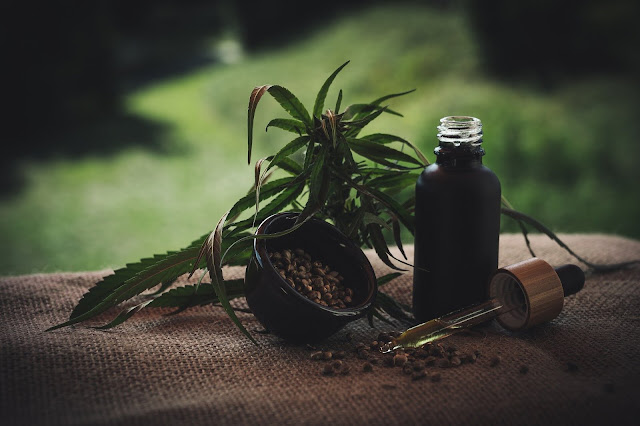https://medicalxpress.com/news/2020-08-reveal-thc-acute-respiratory-distress.html
Credit: CC0 Public Domain
This new paper is based on research studies from the laboratories of Dr. Mitzi Nagarkatti and Dr. Prakash Nagarkatti at the University of South Carolina (UofSC) School of Medicine, Department of Pathology, Microbiology and Immunology.
The Nagarkattis published "Protective Effects of Δ9-Tetrahydrocannabinol Against Enterotoxin-induced Acute Respiratory Distress Syndrome is Mediated by Modulation of Microbiota," with co-authors Amira Mohammed, Hasan Alghetaa and Juhua Zhou, who also work in their UofSC School of Medicine laboratories, and Saurabh Chatterjee from the UofSC Arnold School of Public Health. Drs. Mitzi and Prakash Nagarkatti have for years studied how plant-derived compounds can be used to prevent and reduce inflammation throughout the body.
The incidence of ARDS in the United States is 78.9 per 100,000 persons/year and the mortality rate is 38.5 percent. When inhaled, Staphylococcal enterotoxin can cause ARDS by activating immune cells to produce massive amounts of cytokines leading to "cytokine storm," which can cause the lungs and other organs to fail, often resulting in death. This immune process is similar to that seen in patients with severe COVID-19 who are admitted to the hospital and develop ARDS accompanied by cytokine storm, which leads to respiratory and multi-organ failure. These studies therefore raise the exciting possibility of using cannabinoids to treat ARDS seen in COVID-19 patients.
These studies also showed that Staphylococcal enterotoxin alters the microbiome in the lungs leading to the emergence of pathogenic microbiota. But THC helps this symptom too, by promoting beneficial bacteria that suppress inflammation thereby preventing the damage to the lungs.
"Acute respiratory distress syndrome is triggered by a variety of etiologic agents. Currently, there are no FDA-approved drugs to treat ARDS because of which the mortality rate is close to 40 percent. Our studies suggest that THC is highly effective to treat ARDS and thus, clinical trials are critical to investigate if this works," said Mitzi Nagarkatti.
"Cytokine storm is a huge clinical issue which leads to multiorgan failure and often death. It is also seen in COVID-19 patients, and there are no effective treatment modalities against this syndrome. We have been working on cannabinoids for over 20 years and found that cannabinoids such as THC are highly anti-inflammatory. Thus, our studies raise the exciting suggestion to test THC against ARDS seen in COVID-19 patients," said Prakash Nagarkatti.
The Nagarkatti laboratory has performed decades of pioneering studies on cannabinoids. In fact, their studies on the use of another cannabinoid derived from the cannabis plant, cannabidiol (CBD), to treat autoimmune hepatitis have been well-recognized in the field and have led to FDA approval of CBD as an orphan drug to treat this disorder.
The Nagarkatti Laboratory has published extensively to demonstrate that cannabinoids are potent anti-inflammatory agents that can be used safely to treat a variety of inflammatory and autoimmune diseases such as multiple sclerosis, colitis, hepatitis and the like.
The incidence of ARDS in the United States is 78.9 per 100,000 persons/year and the mortality rate is 38.5 percent. When inhaled, Staphylococcal enterotoxin can cause ARDS by activating immune cells to produce massive amounts of cytokines leading to "cytokine storm," which can cause the lungs and other organs to fail, often resulting in death. This immune process is similar to that seen in patients with severe COVID-19 who are admitted to the hospital and develop ARDS accompanied by cytokine storm, which leads to respiratory and multi-organ failure. These studies therefore raise the exciting possibility of using cannabinoids to treat ARDS seen in COVID-19 patients.
These studies also showed that Staphylococcal enterotoxin alters the microbiome in the lungs leading to the emergence of pathogenic microbiota. But THC helps this symptom too, by promoting beneficial bacteria that suppress inflammation thereby preventing the damage to the lungs.
"Acute respiratory distress syndrome is triggered by a variety of etiologic agents. Currently, there are no FDA-approved drugs to treat ARDS because of which the mortality rate is close to 40 percent. Our studies suggest that THC is highly effective to treat ARDS and thus, clinical trials are critical to investigate if this works," said Mitzi Nagarkatti.
"Cytokine storm is a huge clinical issue which leads to multiorgan failure and often death. It is also seen in COVID-19 patients, and there are no effective treatment modalities against this syndrome. We have been working on cannabinoids for over 20 years and found that cannabinoids such as THC are highly anti-inflammatory. Thus, our studies raise the exciting suggestion to test THC against ARDS seen in COVID-19 patients," said Prakash Nagarkatti.
The Nagarkatti laboratory has performed decades of pioneering studies on cannabinoids. In fact, their studies on the use of another cannabinoid derived from the cannabis plant, cannabidiol (CBD), to treat autoimmune hepatitis have been well-recognized in the field and have led to FDA approval of CBD as an orphan drug to treat this disorder.
The Nagarkatti Laboratory has published extensively to demonstrate that cannabinoids are potent anti-inflammatory agents that can be used safely to treat a variety of inflammatory and autoimmune diseases such as multiple sclerosis, colitis, hepatitis and the like.
Recommend this post and follow The life of Earth


No comments:
Post a Comment
Stick to the subject, NO religion, or Party politics